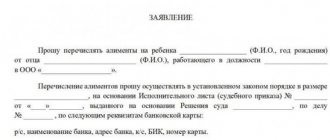Is it possible to change my last name?
A surname is assigned to a person from birth and accompanies him throughout his life until the need or desire to change it arises. You can change your surname if there is a compelling reason, such as marriage, or at your own request. The procedure for changing a surname requires a special procedure, the presence of grounds and the collection of documents.
We recommend that you read more about how to change your last name.
At what age can you change your last name on your own?
Obviously, the specific evidence and procedure depend on what exactly was the argument for changing the child’s surname without the father’s consent. Although this may only happen in some exceptional cases, he will still be able to challenge the decision if he can prove that there was no legal basis for the name change.
Here you will find out when a prenuptial agreement can be declared invalid.
Legislative regulation (read more...)
What does “name” mean and who can change it
At the legislative level, it is determined that the structure of a name consists of information identifying a particular person, namely the surname, first name and patronymic. In the broadest sense of the term, the name can be changed in whole or in part. Any citizen of Russia who has reached the age of 14 years has the right to do this of his own free will at any time.
Parents also have the right to change their name for their children under 14 years of age. It must be borne in mind that before a child reaches fourteen years of age, the law allows only changing the first and last name; changing the patronymic is prohibited.
A mandatory condition associated with the desire to change the name is that the citizen has no motive to hide from the authorities and avoid criminal or other punishment for the illegal actions he has committed.
The law does not contain rules that in any way limit citizens in choosing a name. You can change your name to any other, as long as the new one does not contain numbers.
Reasons for changing your name
When filing an application to change a name, a citizen must indicate a valid reason for making such a decision. It could be:
- cacophony of the name;
- difficulties in pronunciation;
- desire to take the name chosen at baptism;
- desire to have a name consistent with the applicant’s religious beliefs and/or nationality.
The law does not provide an exhaustive list of grounds: the applicant has the right to indicate any reason and refer to any circumstances that, in his opinion, are important and may affect the resolution of the issue.
At what age is it legal to change a name?
The age at which you can change your name is established by the Federal Law “On Acts of Civil Status”. According to its provisions, the minimum age of a citizen at which he has the right to apply for a name change is 14 years.
However, a person's name can be changed much earlier at the request of his parents, adoptive parents or guardians. The decision in this situation is made by the guardianship and trusteeship authorities, and on its basis a decision is made by the head of the administration.
If you are wondering at what age you can change your name without anyone’s permission or consent, then a Russian has the right to independently formalize a name change and receive new documents in connection with this from the age of 18.
Name change for children over 14 years old
In some cases, it becomes necessary to change the name of a child at an already conscious age.
It should be taken into account that upon reaching the age of 14, all citizens of the Russian Federation receive a passport for the first time - the main identification document.
Despite the fact that, from the legal side, a 14-year-old citizen does not yet have all the rights of an adult, from this age he has the right to change his name independently, although for this he will need parental consent certified by a notary.
An adult (once a citizen reaches 16 years of age) has the opportunity to change his name without parental consent.
In the application, such a citizen must indicate the reason for such a change, which will be considered in the usual manner.
How to change a child's name
The child's name is given at birth by agreement of the father and mother. But it happens that the child was named by one name, and later the parents, for some reason, wanted to choose another.
The procedure becomes somewhat more complicated if the child has reached the age of 10, when the name can be changed only on the condition that the opinion of the child himself is taken into account, and his consent is mentioned in the decision made by the guardianship authorities.
If the child himself wishes to change his name, it is worth knowing that until he reaches the age of majority, he will have to obtain the consent of his mother and father, adoptive parents or trustees to implement his plan. In the absence of their consent, a court decision will be required, unless the minor has previously been recognized by a court as fully competent.
Find out more about changing your baby's name.
Required documents
To carry out the procedure, you will have to collect a certain package of documents. Such papers include:
- application in the prescribed form;
- parents' passports;
- the child’s birth certificate, as well as its photocopy;
- consent of the guardianship and trusteeship authority;
- passport of a minor who has reached the age of 14;
- court decision (if mother or father does not approve).
Particular attention must be paid to filling out the application, indicating the following information:
- Full name of father, mother and child;
- home address where the minor is registered at the place of residence;
- changes made to personal data;
- the reason why the applicant wants to contribute them.
An approved application form is available.
Procedure
The change of surname, first name, patronymic is the responsibility of the civil registry office, which registers the fact of a change in basic personal data, so apply for the issuance of a certificate of name change, as well as for a replacement of the birth certificate and amendments to copies of civil status acts in which the applicant’s name appears , you need to go to the registry office. If you are seriously wondering how to change your first and last name, you should consult with this authority about all the nuances of the procedure.
A citizen has the right to begin processing a name change:
- directly at the registry office in the region of residence or at the place of registration of birth of the applicant;
- in a multifunctional center that has the authority to transfer data to the registry office.
The task of the civil registry office when accepting an application for the provision of public services is to:
- requesting information from civil registry offices at the location of the documents;
- reconciling the information in these acts with the information in the documents submitted by the applicant;
- making a decision to approve or refuse the application;
- registering changes in the applicant’s civil status acts or sending him a reasoned refusal in writing.
Please keep in mind that if a name change was made by the civil registry office in relation to Russian citizens, foreign citizens or stateless persons on the territory of the Russian Federation, changes in civil registration records issued by the competent authority of another country in accordance with the provisions of the laws of that state are not made.
Through the registry office
The process of changing a name through the Civil Registry Office is carried out in four stages:
- The citizen personally applies to the Civil Registry Office at the place of registration, fills out an application on the spot, indicating what exactly he would like to change: first name, last name, patronymic or all data at the same time, and presents all the necessary documents.
- Employees of the department, within a month from the date of filing the application, consider the possibility of assigning a new name to the applicant: they collect centralized archives and compare the data of the copies of civil status acts stored in them with the documents provided by the applicant,
- send a request to the Ministry of Internal Affairs to conduct a check on the applicant for criminal records or cases of violation of the law.
That's all you need to change your name. If inconsistencies are found in the documents provided by the applicant and copies of civil status acts received from the civil registry office at the place of their storage, you will have to wait for the inconsistencies to be eliminated.
When the applicant’s request is granted and the name is changed, this fact is reported to the territorial office of the federal executive body at the applicant’s place of residence, which has the authority to control and supervise in the field of migration (GUVM MIA).
Notification of the authorities is mandatory - the head of the civil registry office is given 7 days from the date of completion of registration of the name change to notify the migration service. The citizen has only one month to provide a certificate to the migration service to replace the passport.
Read more about how to change your passport after changing your name.
Through the multifunctional center
Those who want to change basic personal data are often interested in whether it is possible to change their name through a multifunctional center. If they decide to use the electronic service of the MFC, the citizen must fill out an application online for the provision of a state name change service.
The service will prompt the applicant to give his consent to the request by the civil registry office for civil status records from the departments at the place of their storage. The user will also need to select a registry office department from the proposed list.
After receiving an invitation by email to an appointment at the registry office, he will need to appear there in person with all the necessary documents. As you can see, the applicant is not exempt from visiting the registry office in person.
Will the State Services portal help?
If the applicant is interested in how to change the first and last name without leaving home, then the answer is clear - the procedure established by law for changing the personal data of citizens does not provide for actions in any other way than personally submitting an application or contacting the registry office of the applicant’s representative on the basis of a power of attorney.
In particular, submitting applications on the official Public Services Portal has become a very popular way to apply for government services. However, in the matter of changing a name, this resource can be useful only for replacing a passport when a registration certificate has already been received.
Application for name change
The name change is carried out by the Civil Registry Office employees on the basis of an application - for such a document there is a unified form No. 15, approved by Decree of the Government of the Russian Federation of October 31, 1998 No. 1274.
An application in free form cannot be accepted by an employee of the department. Without the date of completion of the document and the signature of the applicant, as well as without indicating the mandatory information about the citizen wishing to change his name, the paper will not be accepted for consideration.
Please review name change applications.
Documents for name change
When a person decides to change his name, he is primarily interested in what documents are needed to change his name, because he does not want confusion to arise later when contacting government agencies or in relationships, for example, with an employer, due to the fact that in various contracts, agreements, certificates and other documents, the citizen is mentioned under his previous name.
So, a citizen is required to present the following documents to change his name at the registry office:
- Passport of the Russian Federation or a passport of another state with a translation into Russian certified by a notary (sometimes an apostille is also required).
- Citizen's birth certificate.
- Birth or adoption certificate for each child under 18 years of age (if available).
- Marriage certificate (if available).
- Certificate of divorce, if a person wishes to return his premarital surname after divorcing his spouse.
- Written consent of parents, adoptive parents, guardians or a court decision to change the name (if the applicant is under 18 years of age). If the minor has been recognized by a court as fully capable, such consent is not required.
- Receipt for payment of state duty.
These are all the documents for a name change; you don’t even need to provide a certificate from a mental health clinic to prove the meaningfulness of your actions.
It is worth thinking about what will happen if you change your name and do not comply with the deadlines given for replacing a passport after assigning a new name to a citizen. In such cases, a fine of 2,500 rubles will be imposed on the violator.
If one of the parents is against
Most often, such parental disagreements can be observed when spouses are divorced. Usually the initiator is a woman who wants to get rid of everything that once connected her with her ex-husband, including the baby’s last and patronymic names. Far-sighted mothers pursue a different goal: if during a divorce they return to their previous surname, and the children remain in their father’s name, then when traveling abroad they have to constantly prove their relationship.
The first thing you need to understand is that it will not be possible to make any changes without the father’s consent. For this reason, it is better to reach an amicable agreement with him. Screaming and scandals are obviously a losing option. If the father still does not give consent, he will have to go to court, which does not always turn out to be on the mother’s side.
However, there are cases in which the father's consent is not required:
- if he does not pay child support and hides his income level;
- has no contact with the child and avoids raising him (this circumstance will be the most difficult to prove);
- his whereabouts are unknown;
- if he is deprived of parental rights.
Any of these grounds will have to be proven documented. Find out more about how to change a child’s surname without the father’s consent.
What is the time frame for changing a name?
The registry office authorities are given 30 days to study the documents, starting from the date of acceptance of the application. The period can be extended by the head of the department’s department for no more than 2 months. This can happen if the civil registry office, which stores the applicant’s civil status acts, did not present any requested copy of the record to the authority where he applied to change his name. Additional time will be required to resubmit your request.
The question arises of how to change the name if copies of civil status acts to which changes need to be made were lost by the Civil Registry Office. In such a situation, you will have to file a claim in court based on a report from the Civil Registry Office about the absence of primary or restored documents. And the restoration of civil status acts will be carried out on the basis of a court decision that has entered into force. Once the incident with the lost documents is resolved, the process of exploring the issue of changing the name will continue.
Also, the waiting time will be longer if a difference is found between the data in the records submitted by the registry office at the place of their storage and the documents submitted by the applicant along with the application. Until the circumstances are clarified and the inconsistencies are eliminated, the name cannot be changed.
If the birth certificate was issued in the former Soviet republics, a request to confirm the data is sent there, and waiting for a response will also require additional time - but usually no more than a month.
Consent or refusal
After the civil registry office staff has examined the documents provided, they will draw up a conclusion on making changes and issuing a new certificate or refusing this correction.
It is worth considering the following:
- Refusal to make changes to the birth certificate must be made only in writing, which must indicate its exact reason. If the refusal was made orally or the parents do not agree with the decision made, then the actions of the head of this department of the registry office can be appealed in court.
- If you agree, a new birth certificate will be issued at the local registry office - at the place of application.
The period for consideration of this expression of will is one month from the date of filing the application.
If the registry office agrees to change the name, only a month later a new birth certificate will be drawn up and issued, and the previous document will be declared invalid - it is subject to confiscation.
Video: How to change a child's last name?
Similar articles:
- Certificate of non-receipt of a lump sum benefit upon the birth of a child
- How to obtain a child’s birth certificate from the registry office using form F24?
- Who can be a child's godparents?
- What regional payments exist at the birth of a child?
- How do I put my citizenship stamp on my birth certificate?
- Previous post How to put a mark on citizenship on a birth certificate?
- Next entry What regional payments exist at the birth of a child?
Comments on the article “Is it possible to change a child’s name on a birth certificate?”
Nobody has written anything yet. Be the first!
Service cost
Changing the name requires the applicant to pay a state fee in the amount of 1,600 rubles, regulated by paragraphs. 4 paragraphs 1 art. 333.26 of the Tax Code of the Russian Federation. A fee is charged for registering the name change and issuing the corresponding certificate.
If a citizen needs to re-obtain a certificate of name change, a separate state fee of 350 rubles is provided for this. The amount of this duty is established by paragraph 2, paragraph 1, art. 333.27 of the Tax Code of the Russian Federation.
Read in detail about the cost of the state fee for changing your surname.
At what age can you change your last name on your own?
Certificates (certificates) issued by the Moscow Civil Registry Office do not need to be provided during registration of a name change if no changes are made to them and if they:
- a copy of the court decision to deprive a parent of parental rights;
- a copy of the court decision declaring the parent incompetent;
- a copy of the court decision to limit the parent's parental rights;
- a copy of the court decision recognizing the parent as missing;
- parent's death certificate;
- a certificate from the bailiff service about the presence of arrears in the payment of alimony (to confirm evasion of education).
1. In what cases can you change a child’s name? (read more…)
When they can refuse
In order not to face a refusal and not waste time applying again, you need to find out in advance what is needed to change your name. Thus, registration may be refused for the following reasons:
- A citizen tries to evade responsibility by changing personal data: for example, he evades paying alimony or hides from criminal prosecution.
- The applicant submitted an incomplete set of documents.
- The citizen wishing to change his name did not pay the state fee and, accordingly, did not provide a receipt confirming the fact of payment.
- The guardianship and trusteeship authorities made a negative decision regarding changing the child’s name (including due to the refusal of the child over the age of 10 to change his name).
- A minor child who has not previously been recognized as emancipated has not received consent to change his name from his parents, adoptive parents or guardians; or the court decision was not in his favor.
- The name chosen by the applicant contains numbers.
In case of refusal, the head of the civil registry office must explain in writing why the applicant was refused and monitor the return of all documents attached by the citizen to the application.
Protesting a refusal
To reduce the likelihood of the need to appeal the decision of the civil registry office, you should find out in advance how to change your name correctly. If a citizen was denied registration of a civil status act - a change of name, the applicant has the right to appeal the actions (inaction) of government agency employees.
Be sure to exercise your right: demand and keep a written refusal.
You can explain the essence of your dissatisfaction in writing or orally to an official:
- executive body of the constituent entity of the Russian Federation, whose competence includes organizing activities for registration of acts of civil status,
- territorial body of the authorized federal executive body exercising control and supervision functions in the field of state registration of acts of civil status.
Usually, a pre-trial settlement is enough to resolve the issue and either get a positive decision on a name change, or make sure there are real legal reasons for refusing to obtain a state class=”aligncenter” width=”663″ height=”411″[/img]
However, if, even after receiving a repeated refusal, the applicant insists on changing his name, he has the right to file a claim in court.
You will need to draw up a statement of claim and attach the following documents to it:
- a copy of an identity document;
- documents confirming the existence of grounds for changing the name;
- written refusal by the head of the registry office to register a name change.
The consideration of such a written complaint will take no more than a month starting from the date of its registration. When it becomes necessary to extend the period for consideration of a complaint in connection with an inspection or referral of a request to other government agencies, the complainant will receive a notice of extension of the period for consideration by 30 days.
If the court decision is made in favor of the applicant, the civil registry office will be required to register the change of name on the day the citizen presents the court decision.
What documents need to be replaced after changing the name
The procedure for changing your name is not too complicated. Difficulties arise when a citizen finds out which documents need to be changed when changing his name, because most of them must be replaced in a short time. Some documents, for example, a diploma of higher education, remain valid, and if presented at the place of request, you only need to attach a copy of the certificate of change of name.
Need to change:
- passport;
- international passport;
- TIN;
- pension certificate;
- compulsory medical insurance policy;
- work book (no need to change, but changes are required;
- driver license;
- children's birth certificates;
- a valid marriage certificate;
- military ID;
- bank cards;
- property documents.
Find out more about what documents need to be replaced after a last name change.









